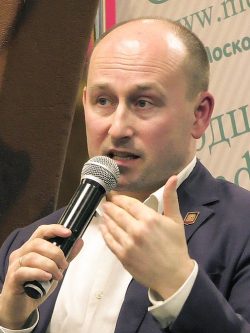Propagandist
STARIKOV, Nikolay Viktorovich (b. 1970 in Leningrad) graduated from the Engineering and Economics Institute in St. Petersburg in 1992 with a major in Chemical Engineering. After graduation, he worked as a security guard, sales manager, and loader. In 1994, he joined Chance Publishing House as an Advertising Manager. In 1998, he became Deputy Commercial Director of the Regional Television Channel. In 2003, he became Commercial Director of Channel One (St. Petersburg). In 2011, he created the public organization Trade Union of Citizens of Russia and, in 2013, the Great Fatherland Party. In 2015, he co-founded the Antimaidan movement. In 2018, after a split in the Great Fatherland Party, he created the Party of Patriots of the Great Fatherland.
Fostering political repression and dictatorship in Russia, the propaganda of aggressive war and social intolerance.
The Great Fatherland Party, led by Starikov, co-authored the bill, which was adopted on December 21, 2012, becoming the infamous Dima Yakovlev Bill. The document introduced a ban on the adoption of Russian orphans by American citizens. The issue of violation of the rights of orphans by foreign adoptive parents was raised to form a sharply negative attitude towards foreigners in society and to cement anti-Western propaganda. The bill was a so-called “retaliatory measure” after the U.S. adopted the Magnitsky Act, which imposed sanctions against corrupt Russian officials involved in a violation of human rights. Experts in protecting the rights of children sharply criticized the bill and called it inhumane to children left without parental care. The purpose of the law was not to protect the rights of minors, but “political speculation” and “retaliatory response” to the Magnitsky Act, that affected the interests of the Russian ruling elite.
The party of Starikov also participated in the development of a bill on combating separatism. The bill introduced article 280.1 in the Criminal Code, formulated as “public appeals for actions aimed at violating the territorial integrity of the Russian Federation.” The article imposes responsibility for “public calls” for separatism, including using the media or electronic or telecommunication networks (including the Internet). It introduced imprisonment for up to 5 years, large fines and other preventive measures for separatist calls. The bill received negative assessments from the media, politicians and the public. The bill was associated with the annexation of Crimea and an attempt to suppress any critical assessments regarding the Crimean policy. Following the adoption of the bill, criminal proceedings were launched against civil activists and ordinary citizens of the Russian Federation for publications on social networks. Article 280.1 is used along with other articles on extremism and terrorism. Experts associate the tightening of anti-extremist legislation with the desire of the authorities to fight political opponents and suppress dissent among citizens. Thus, the report of Human Rights Watch notes that the Russian authorities use extremism laws to punish opposition members and prevent Russians from expressing their opinions.
The main goals of Starikov’s organizations, according to their statements and charters, are the fight against “color revolutions” and the “fifth column,” the promotion and protection of “traditional values,” and “preventing the overthrow of the legally elected government.” Proponents of the movements call themselves patriots, while they openly advocate for Stalinism and call for the restoration of the empire. Democratic opposition and sexual minorities are their immediate enemies, as proponents of the movements state publicly. For example, the manifesto of Antiьaidan, along with “preventing the implementation of color revolutions, chaos, and anarchy,” sets the task of “monitoring the actions of participants in protests.” The documents of the Trade Union of Citizens of Russia reinforce the need to restore the death penalty for particularly serious crimes, in which, they include “treason to the motherland.”
The rhetoric of these organizations is based on leaderism, rejection of tolerance, state-centrism, anti-Western propaganda, and conspiracy theories. Proponents of the movements openly demonstrate intransigence and outright hatred of any opposition, which they perceive as a means of destroying “great Russia” with Western recipes. The actions of members of these organizations are aggressive and provocative. More than once they physically attacked opposition activists. The behavior of supporters of these organizations can be qualified as a direct threat to opposition forces and intimidation.
Starikov and his movements are elements of an extensive system of state propaganda, designed to form a distorted view of reality among Russian citizens, according to which Russia is surrounded by enemies and is a victim of a conspiracy. Movements and organizations under his leadership instill an atmosphere of hatred, perform functions of intimidation and terror against the opposition forces to eliminate all political competition and opposition to the regime of Vladimir Putin.
Links and materials
Статья о Н. Старикове на сайте «Перебежчик»
Президент подписал закон о запрете «пропаганды сепаратизма»
В РФ за призыв к сепаратизму предлагают сажать на 20 лет
Депутаты ввели уголовное наказание за призывы вернуть Крым
Кремль закупает книжки с раскрасками и рецептами самогона
«Боевое братство» и «Ночные волки» создают в России движение «Антимайдан»
Антимайдан (Россия)-статья в Википедии
Михаила Касьянова встретили граблями
«Хорошо, что кто-то еще помнит»
Профсоюз граждан России-статья в Википедии
Молодые поклонники Сталина вышли на Малую Садовую улицу
Интернет-Ополчение. Знать врага в лицо!
Официальный сайт Интернет Ополчения
Изборский клуб-статья в Википедии
В РГГУ студенты устроили акцию протеста на лекции Николая Старикова
«Я добавлю. Можно, да?» «Антимайдан» выступил с заявлением по поводу убийства Бориса Немцова
Антимайдан — сообщество в сети вк
Активисты «Антимайдана» призвали рекламодателей «Медузы» отказаться от сотрудничества с нацистами
«Антимайдан»-информационно-аналитический ресурс
Профессор РГГУ о протесте против лекций «Антимайдана»
БУДНИ ТЕЛЕПРОПАГАНДЫ. ЯНВАРЬ-ФЕВРАЛЬ 2015
В программы военных кафедр хотят включить курс противодействия революциям
Украина запретила ввоз ряда изданных в России книг
Авторы трудной библиографии Украина запретила к ввозу книги российских фантастов и публицистов
Следующая станция — университет
Кто финансирует развал России? От декабристов до моджахедов
В Петербурге «Великое отечество» устроило провокацию на антисталинистской акции
В Москве завершилась акция «Антимайдана»
В Крыму журналиста Николая Семену приговорили к 2,5 годам условно с запретом публичной деятельности
7 человек осуждены в России за призывы к сепаратизму
«Гомофобский» закон возмутил немцев

